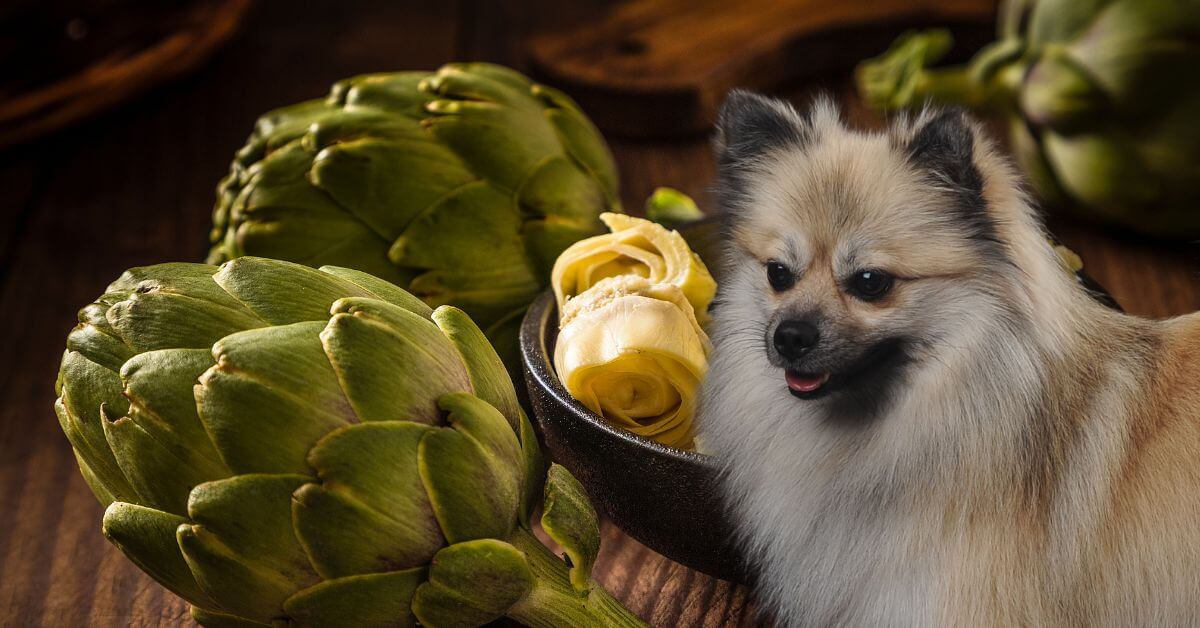Can Dogs Eat Artichokes?
Yes! Dogs can eat artichokes and even benefit from the good nutrients! Artichokes are packed with vitamins, antioxidants, and fiber that can benefit your dog’s health. However, like other “human food” veggies, artichokes are high in fiber and can sometimes upset your dog’s stomach if given in large amounts. When artichokes are in season (March to May and again from September to October), I love preparing them with olive oil, salt, and garlic powder—totally not safe for dogs! But a plain, cooked artichoke without added seasoning can be a healthy vegetable for your dog. Let’s dive deeper into the benefits and considerations of feeding artichokes to dogs!

Artichokes are full of fiber, which is great for your dog’s digestion. Fiber keeps their bowel movements regular, prevents constipation, and helps them feel full, which can be good for managing their weight. In premium dog kibble, the fiber content typically ranges from 2% to 5%. Adding a bit of extra fiber from natural sources like artichokes can be beneficial, especially for dogs with digestive issues.
Fiber is also a prebiotic food, and it helps your body grow healthy gut bacteria, which is important for digestion and nutrient absorption. This is particularly important for your dog’s gut health. Including fiber-rich foods in your dog’s diet can help maintain a balanced gut microbiome, leading to better health and a stronger immune system. Given these benefits, artichokes sound really awesome (and they are), so now you only need to learn how to prepare them safely.
How to feed your dog artichokes
When cooking for your dog, you have to forget about any salt, seasonings, and oil. Dogs can only eat bland, unseasoned vegetables, which is good for them! First, only give your dog the tender parts of the artichoke, such as the heart and stem, as the leaves are tough and can cause choking or intestinal blockages. Artichoke leaves are fibrous and difficult for dogs to digest. Don’t even give them as a joke, even though they may enjoy chewing them.
Regarding raw vs. cooked artichokes, cooked is generally the better option. Steaming or boiling artichokes until soft makes them easy for your dog to eat. Raw artichokes can be tough and more difficult for your dog to process, potentially leading to digestive issues, but still, it’s not an issue if your dog has some.
Always cut the artichoke into small, bite-sized pieces before feeding it to your dog. This way, there’s no risk of choking. Start with small portions to see how your dog’s system reacts, as introducing a high-fiber food like artichokes can sometimes cause an upset stomach. If your dog tolerates the artichoke well after a day or so, you can gradually increase the amount, but remember to keep it in moderation. This is the rule for any dog-safe vegetables.
Don’t give your dog fermented or marinated artichokes
Avoid giving your dog marinated artichokes or dishes made with artichokes, like artichoke dip. We previously wrote about an interesting study on the dangers of fermented vegetables when we analyzed whether dogs can eat bok choy safely, which showed that eating fermented bok choy can lead to similar oxidative damage in dogs, as seen in ruminants. Marinated artichokes often contain high levels of fat, oil, and seasonings that can upset your dog’s stomach, causing vomiting or diarrhea.
What happens if a dog eats artichoke leaves
They are curious and sometimes act like little omnivores, getting into all sorts of things. They might accidentally eat artichoke leaves from the garbage bin or compost pile or even steal them off the table. The good news is that artichoke hearts, leaves, and stems are not toxic if ingested by dogs. However, the bad news is that they often cause vomiting and diarrhea. In some cases, eating artichoke leaves can lead to more serious issues, like intestinal obstructions.
An obstruction happens when the dog eats something too big or bulky to pass through the digestive tract normally, getting stuck in the intestines. If your dog has a blockage, you might notice symptoms like:
- trying to vomit
- poop defecate without success
- you’ll notice increased lethargy
- loss of appetite
- or even a painful, bloated stomach
If you see any of these signs, it’s crucial to get your dog to the vet immediately or to an emergency vet if it’s after hours. Hopefully, you’ll just see some vomiting or diarrhea, but keep an eye out for other symptoms. If your dog doesn’t show any problems in the next several days, you’re probably in the clear. Always watch for any signs of discomfort and consult your vet if you’re concerned.
Health benefits of artichokes for dogs
So, now you know that dogs can eat artichokes! Give them only tender parts like heart and stem, avoid seasoning, and steer clear of marinated or heavily prepared artichokes.
Love, life, and fur forever!
FAQs
Can dogs eat artichoke hearts?
Yes, dogs can eat artichoke hearts. They are safe and nutritious, offering vitamins, minerals, and fiber. Just ensure they are plain and unseasoned.
Can dogs eat artichoke dip?
No, dogs should not eat artichoke dip. It often contains high-fat ingredients and seasonings, which can upset their stomach and be harmful.
Can dogs eat cooked artichokes?
Yes, dogs can eat cooked artichokes. Steaming or boiling them without any added seasonings is best, as it makes them easier to digest and safe for your dog.
Can dogs eat canned artichoke hearts?
No. Canned artichoke hearts often contain added salt and preservatives, so it’s better to avoid them. If your dog had some accidentally, they may end up with an upset stomach.